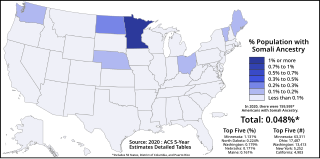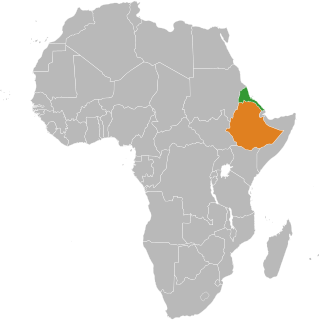
The politics of Eritrea and the government of Eritrea take place in the framework of a single-party presidential republican totalitarian dictatorship. The President officially serves as both head of state and head of government. The People's Front for Democracy and Justice is the only political party legally permitted to exist in Eritrea. The popularly elected National Assembly of 150 seats, formed in 1993 shortly after independence from Ethiopia, elected the current president, Isaias Afwerki. There have been no general elections since its official independence in 1993. A new constitution was drafted in 1993 and ratified in 1997, but has not been implemented. Since the National Assembly last met in January 2002, President Isaias Afwerki has exercised the powers of both the executive and legislative branches of government.

Meles Zenawi Asres, born Legesse Zenawi Asres was an Ethiopian soldier and politician who served as president of Ethiopia from 1991 to 1995 and as prime minister from 1995 until his death in 2012.

The Eritrean People's Liberation Front (EPLF), colloquially known as Shabia or HGDEF, was an armed Marxist–Leninist organization that fought for the independence of Eritrea from Ethiopia. It emerged in 1973 as a far-left to left-wing nationalist group that split from the Eritrean Liberation Front (ELF). After achieving Eritrean independence in 1991, it transformed into the People's Front for Democracy and Justice (PFDJ), which serves as Eritrea's sole legal political party.
The Algiers Agreement was a peace agreement between the governments of Eritrea and Ethiopia that was signed on 12 December 2000, at Algiers, Algeria, to formally end the Eritrean–Ethiopian War, a border war fought by the two countries from 1998 to 2000. In the agreement, the two parties reaffirmed the Agreement on Cessation of Hostilities, which had been signed on 18 June 2000.

The Eritrean–Ethiopian War, also known as the Badme War, was a major armed conflict between Ethiopia and Eritrea that took place from May 1998 to June 2000.
Paulos Tesfagiorgis is an Eritrean human rights activist. Fought for his people by establishing the only PFDJ licensed Regional Centre for Human Rights and Development in Eritrea. Tesfagiorgis was also co-founder and head of the Eritrean Relief Association during the Eritrean war of independence.

Tigrayans are a Semitic-speaking ethnic group indigenous to the Tigray Region of northern Ethiopia. They speak the Tigrinya language, an Afroasiatic language belonging to the Ethiopian Semitic branch.
Ethiopian Americans are Americans of Ethiopian descent, as well as individuals of American and Ethiopian ancestry. The largest Ethiopian American community is in the Washington, D.C. metropolitan area, with some estimates claiming a population of over 200,000 in the area; other large Ethiopian communities are found in Minneapolis–Saint Paul, Las Vegas, Seattle–Tacoma–Bellevue, Denver, the San Francisco Bay Area, Los Angeles, Salt Lake City, Columbus, and South Dakota.
The provinces of Eritrea existed since pre-Axumite times and became administrative provinces from Eritrea's incorporation as a colony of Italy until the conversion of the provinces into administrative regions. Many of the provinces had their own local laws since the 13th century.

Somali Americans are Americans of Somali ancestry. The first ethnic Somalis to arrive in the U.S. were sailors who came in the 1920s from British Somaliland. They were followed by students pursuing higher studies in the 1960s and 1970s, by the late 1970s through the late 1980s and early 1990s more Somalis arrived. However, it was not until the mid and late 1990s when the civil war in Somalia broke out that the majority of Somalis arrived in the United States. The Somali community in the U.S. is now among the largest in the Somali diaspora.

Ethiopia–United States relations are bilateral relations between Ethiopia and the United States. Ethiopia is a strategic partner of the United States in the Global War on Terrorism. The United States is the largest donor to Ethiopia: in 2008 U.S. foreign aid to Ethiopia totaled US$969 million, in 2009 $916 million, with 2010 estimated at $513 million and $586 million requested for 2011. U.S. development assistance to Ethiopia is focused on reducing poverty and supporting economic development emphasizes economic, governance, and social sector policy reforms. Some military training funds, including training in such issues as the laws of war and observance of human rights, also are provided.
Ruth Abraha, also known as Rutta Abraha, is a singer from Eritrea. She is the lead singer of the group Wari.
Eritrean Americans are an ethnic group of Americans who are of full or partial Eritrean national origin, heritage and/or ancestry.

Relations between Eritrea and Ethiopia have been historically adversarial. Eritrea gained independence from Ethiopia in 1993 after the Eritrean War of Independence, after which relations were cordial. Since independence Eritrea's relationship with Ethiopia was entirely political, especially in the resuscitation and expansion of IGAD's scope. However, the 1998 Eritrean–Ethiopian War marked a turning point, and their relationship became increasingly hostile.

The 2018 Eritrea–Ethiopia summit was a bilateral summit that took place on 8–9 July 2018 in Asmara, Eritrea, between Eritrean President Isaias Afwerki and Ethiopian Prime Minister Abiy Ahmed and officials from the two countries.

Zeremariam Fre is an agriculturalist, specialising in the drylands, and is of dual Eritrean-British nationality. He is the founder and former director of the Pastoral and Environmental Network in the Horn of Africa (PENHA), where he now serves on the Board of Trustees as Treasurer.
The Europe External Programme with Africa and Europe External Policy Advisors, both called EEPA, are two closely associated Belgian-based non-governmental organizations that aim to encourage the European Union's involvement in human rights in general (EEPA/Advisors) and, in particular, in the Horn of Africa and North Africa (EEPA/Africa).

Eritrean nationality law is regulated by the Constitution of Eritrea, as amended; the Eritrean Nationality Proclamation, and its revisions; and various international agreements to which the country is a signatory. These laws determine who is, or is eligible to be, a national of Eritrea. The legal means to acquire nationality, formal legal membership in a nation, differ from the domestic relationship of rights and obligations between a national and the nation, known as citizenship. Nationality describes the relationship of an individual to the state under international law, whereas citizenship is the domestic relationship of an individual and the nation. Eritrean nationality is typically obtained under the principle of jus soli, i.e. by birth in Eritrea, or jus sanguinis, born to a mother or a father of Eritrean origin or parents who came to Eritrea before 1934. It can be granted to persons with an affiliation to the country, or to a permanent resident who has lived in the country for a given period of time through naturalization.

The events of the Tigray War have sparked numerous reactions and protests worldwide.

The Eritrean diaspora comprises about half of population living in the country, becoming the most diasporic nation. In addition, one third Eritreans live aboard. In 2022, 37,357 Eritreans fled to Sudan, Egypt and Libya for seeking asylum, estimated around 1% of its population. Since 2001, 700,000 people have left the country as a result of political repression under Isais Afwerki. In 2015, approximately 40,000 Eritrean arrived via Mediterranean, becoming small country with large refugees in Africa.














